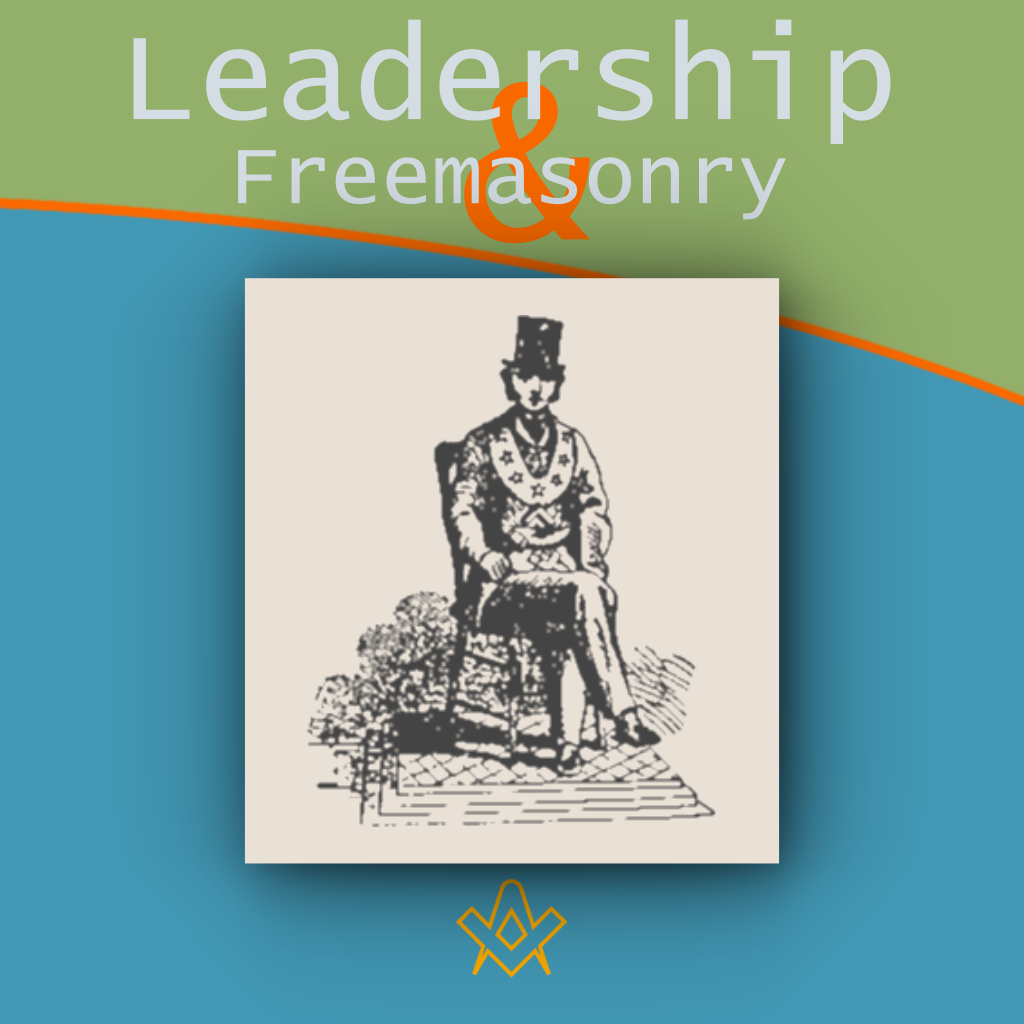At a conference I recently attended, there was a presentation on leadership. However, the presenter only provided the desirable characteristics of a leader as: trust, communication, self-awareness, empathy & self respect, gratitude, vision, and courage but these do not describe what a leader actually does or does not do.
The word ‘lead’ is a verb that means ‘control’, and the word ‘leader’ describes the person who leads or controls.
Consequently, a leader, whether they lead a donkey on a tether or a group of people who have a definitive objective must have some background or experience in controlling donkeys or have a background or experience regarding the particular definitive objective.
Being a Professional Engineer for 35 years, I developed a list of five essential elements of a leader so that I could ensure that I was on track myself, as follows:
1 Know where you are going.
2 Check your progress regularly.
3 Ensure the right people are in the right positions.
4 Personally train your subordinates.
5 Find your replacement.
Reviewing each one of these points in turn, we need to know where we are going if we are to lead people, whether it is to a geographical destination or teaching people to complete a particular definitive objective.
Without checking the progress, one may never reach the destination or complete the objective.
Progress may be checked various ways: miles walked, time to complete various stages, games won, weight lifted, percent correct on a quiz, dollars spent, etc.
Ensuring the right people are in the right positions. The right person in a position that they are suited for results in a productive scenario.
It is essential to deal with the actively disengaged individual, they tend to cause strife with their peers and sabotage projects.
One cannot be a leader if one does not know anything about the particular definitive objective. If one does not know what a widget looks like then one cannot tell someone how to make one.
It seems that today there are far too many managers who have no idea how to train their subordinates. The success of the apprenticeship system results from those who know teaching those who do not know.
Finding your replacement is essential for continuity. Steps 3. and 4. should provide sufficient and well-trained individuals to become your replacement.
Remember the chief executive officer of 80% of great organizations were promoted from within the organization. White knights only happen in fairy tales.
Non subject matter experts are not great leaders. There have been many examples of disasters when the non subject matter experts made inappropriate decisions, such as NASA’s Space Shuttle Challenger O ring decision, 7 dead; Walkerton Ontario water crisis, 7 dead, 2300 sick; the Titanic, 1500 dead; the Charge of the Light Brigade, 110 dead 160 wounded 375 horses lost; etc.
The whole point of Freemasonry apart from the fraternal social aspects is to train men to have a better demeanor, to be better public speakers, to be able to run a formal private or public meeting, to be able to train others in the same.
This is accomplished by participating in the Lodge Work, learning the Work, learning the scenarios when and where to stand, walk, turn, and talk, presenting the lectures, organizing the Work, and being able to teach the junior brethren the same by being an accomplished Freemason.
Every position in Lodge provides a lesson to be learnt: Stewards making the candidate feel comfortable and assured, the Tyler and Inner Guard by being attentive and speaking boldly, Deacons learning people’s names and the scenarios of the floor work, the Junior Warden looking after the brethren at refreshment, and the Senior Warden ensuring the Lodge is ready for the meeting and investigating and vouching for visitors.
The specialised members are the Chaplain, Organist, Secretary, Treasurer, and Registrar. Serving as the Chaplain should result in a member being comfortable when called upon to offer a prayer at a wedding, a christening party, or a thanks giving meal.
Being a Secretary or Registrar, one should be able to improve one’s writing skills at very minimum.
While being the Treasurer one should learn about income and expenditure statements and balance sheets, good for reading the financial statements of public corporations.
All of which trains a member to be the Master of a Lodge, the Leadership role, the one who controls the Lodge, and provides instruction to the new member.
Three Great Masonic Leaders of the Past
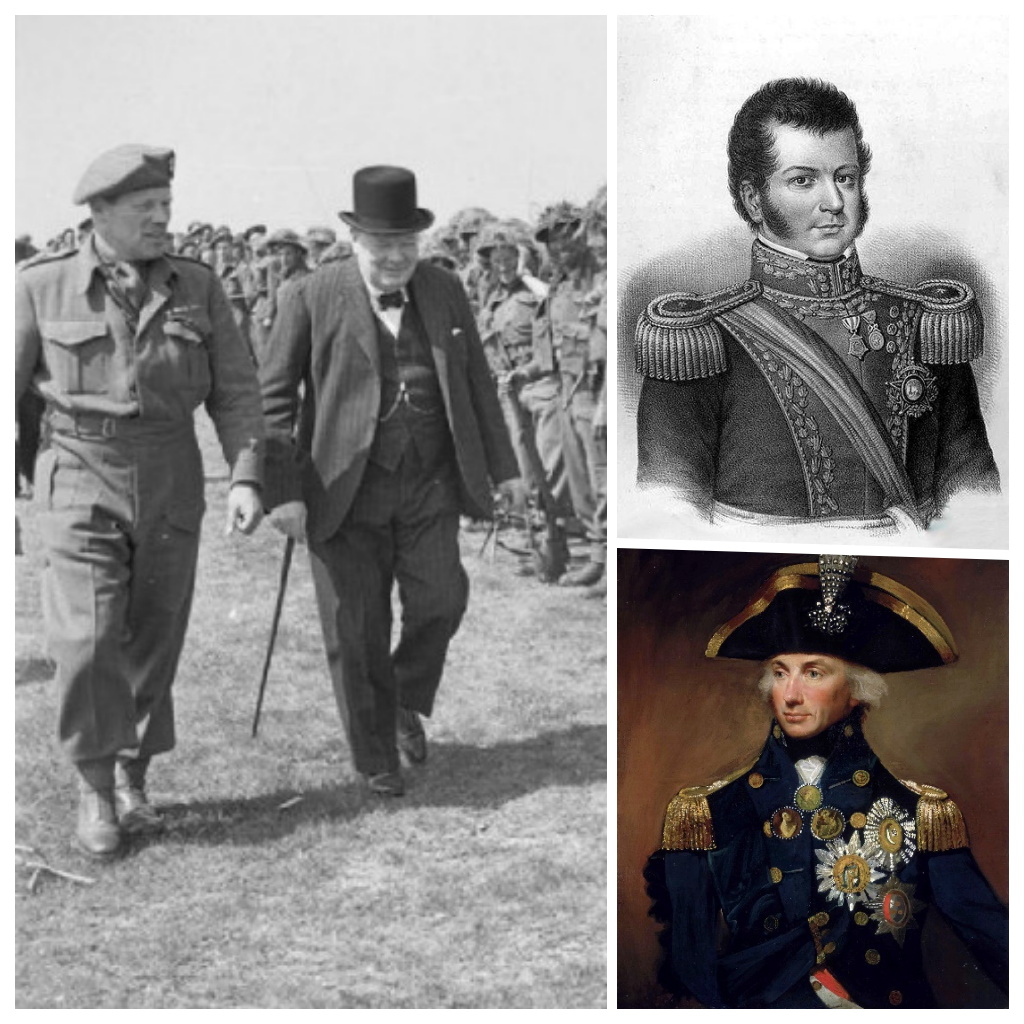
Left: Winston Churchill 1874 – 1956
Right Top: Barnardo O’Higgins 1776 – 1842
Right Lower: Horatio Nelson 1758 – 1805
IMAGE LINKED: wikimedia Attribution 4.0 International (CC BY 4.0)
Note: While it is acknowledged that there is no documented proof that Horatio Nelson was a Freemason. John Webb’s ‘Horatio, Admiral Lord Nelson Was he a Mason?’, seems to have confined his researches to Lodges under the English Registers.
However, the author lived in the Caribbean during the late 1970s for a little under a year, attended a number of Masonic Lodges and became acquainted with a number of Freemasons.
It was their contention that Horatio Nelson was made a mason on board a ship-of-the-line in English Harbour, Antigua. Moderns and Ancients Lodges as well as Irish Lodges including at least one Irish military Lodge and one Scottish Lodge were well established in the Caribbean at that time.
‘Albion Lodge 196 E.R. A History 1790 to 1976’, N. G. D. Atwell, Cot Printery Ltd., Barbados, 1976.
Consequently, until further in-depth research is carried out, the only knowledge that exists of Horatio Nelson being a Freemason relies on the Masonic lore of our brethren in the Caribbean.
Note: Winston Churchill was a freemason between 1091 – 1912. He had resigned many years before being elected Prime Minister
Further reading:
Four Seasons: The Story of a Business Philosophy, Isadore Sharp, Penguin Group, 2009
Moneyball: The Art of Winning an Unfair Game, Michael Lewis, W. W. Norton & Company, 2004
Good to Great, Jim Collins, Harper Collins Publishers Inc., 2001
https://dictionary.cambridge.org/dictionary/english/lead lead verb (CONTROL)

SQ Leadership & Personal Development Books
Selected Books on Leadership and Personal Development available at Amazon
more….

Four Seasons: The Story of a Business Philosophy
By: Isadore Sharp
How did a child of immigrants, starting with no background in the hotel business, create the world’s most admired and successful hotel brand? And how has Four Seasons grown so dramatically, over nearly half a century, without losing its focus on exceptional quality and unparalleled service?
Isadore Sharp answers these questions in his inspiring memoir. He started out in Toronto, the son of a modest builder from Poland, but ambition and fate rapidly took him beyond his father’s three-man construction business.
Sharp learned the hotel business by trial and error. His breakthrough was a vision for a new kind of hotel, featuring superior design, top-quality amenities, and, above all, a deep commitment to service. Today, Four Seasons is widely recognized as the world leader in comfort and luxury—in fact, it sets the standard by which every luxury hotel is measured.

Moneyball: The Art of Winning an Unfair Game
By: Michael Lewis
“This delightfully written, lesson-laden book deserves a place of its own in the Baseball Hall of Fame.” ―Forbes
Moneyball is a quest for the secret of success in baseball. In a narrative full of fabulous characters and brilliant excursions into the unexpected, Michael Lewis follows the low-budget Oakland A’s, visionary general manager Billy Beane, and the strange brotherhood of amateur baseball theorists. They are all in search of new baseball knowledge―insights that will give the little guy who is willing to discard old wisdom the edge over big money.
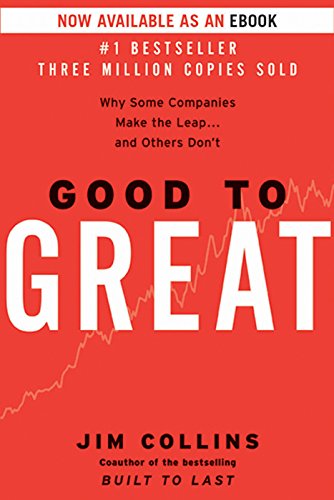
Good to Great – Why Some Companies Make the Leap…And Others Don’t
By: Jim Collins
The Challenge
Built to Last, the defining management study of the nineties, showed how great companies triumph over time and how long-term sustained performance can be engineered into the DNA of an enterprise from the verybeginning.
But what about the company that is not born with great DNA? How can good companies, mediocre companies, even bad companies achieve enduring greatness?
The Study
For years, this question preyed on the mind of Jim Collins. Are there companies that defy gravity and convert long-term mediocrity or worse into long-term superiority? And if so, what are the universal distinguishing characteristics that cause a company to go from good to great?
The Standards
Using tough benchmarks, Collins and his research team identified a set of elite companies that made the leap to great results and sustained those results for at least fifteen years. How great? After the leap, the good-to-great companies generated cumulative stock returns that beat the general stock market by an average of seven times in fifteen years, better than twice the results delivered by a composite index of the world’s greatest companies, including Coca-Cola, Intel, General Electric, and Merck.
The Comparisons
The research team contrasted the good-to-great companies with a carefully selected set of comparison companies that failed to make the leap from good to great. What was different? Why did one set of companies become truly great performers while the other set remained only good?
Over five years, the team analyzed the histories of all twenty-eight companies in the study. After sifting through mountains of data and thousands of pages of interviews, Collins and his crew discovered the key determinants of greatness — why some companies make the leap and others don’t.
The Findings
The findings of the Good to Great study will surprise many readers and shed light on virtually every area of management strategy and practice. The findings include:
• Level 5 Leaders: The research team was shocked to discover the type of leadership required to achieve greatness.
• The Hedgehog Concept (Simplicity within the Three Circles): To go from good to great requires transcending the curse of competence.
• A Culture of Discipline: When you combine a culture of discipline with an ethic of entrepreneurship, you get the magical alchemy of great results. Technology Accelerators: Good-to-great companies think differently about the role of technology.
• The Flywheel and the Doom Loop: Those who launch radical change programs and wrenching restructurings will almost certainly fail to make the leap.
“Some of the key concepts discerned in the study,” comments Jim Collins, “fly in the face of our modern business culture and will, quite frankly, upset some people.”
Perhaps, but who can afford to ignore these findings?
Recent Articles: skills
 7 Soft Skills Taught In Freemasonry Discover how Freemasonry nurtures seven irreplaceable soft skills—collaboration; Communication, Teamwork, Empathy, Flexibility, Conflict Resolution, Active Listening, and Trustworthiness. Explore how these essential human attributes, grounded in emotional intelligence and ethical judgment, remain beyond the reach of AI. |
 Freemasonry and Reskilling in the age of AI The article explores the challenges and strategies organizations face in reskilling their workforce in the era of automation and artificial intelligence. It highlights the need for companies to view reskilling as a strategic imperative and involve leaders and managers in the process. The article also emphasizes the importance of change management, designing programs from the employee's perspective, and partnering with external entities. |
 Ten Central Commandments or Principles of Freemasonry Embrace the wisdom of Freemasonry's teachings in your personal journey towards self-improvement and stronger leadership. By upholding virtues of integrity, compassion, and respect, and uniting these with a commitment to continuous learning and social responsibility, inspire change. Transform yourself and the world around you, fostering a legacy of positivity and enlightenment. |
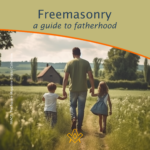 Freemasonry: A Guide to Fatherhood In the sacred halls of Freemasonry, fathers discover a hidden power to transform their parenting journey. With its timeless values, supportive community, and life-enriching teachings, Freemasonry empowers fathers to provide a moral compass, foster self-improvement, build stronger connections, and embrace the confidence and wisdom needed to navigate the complex realm of fatherhood. |
 Courage as a core value in Freemasonry Freemasonry, a revered fraternity, prioritizes virtues like honesty and charity. However, courage is foundational. From Plato to Maya Angelou, courage is vital for other virtues. Freemasonry's teachings, referencing events like Gettysburg, emphasize diverse courage forms. In today's divided world, Masons promote and exemplify courage, understanding its importance in facing challenges. |
 How Freemasonry Cultivates Ideal Entrepreneurial Traits Freemasonry's cryptic rituals hold timeless lessons for building entrepreneurial greatness. Through tests of passion, vision and skill, Masonic teachings forge ideal traits like grit, creativity and alliance-making needed to seize opportunity and elevate enterprises. The right commitment unlocks code for entrepreneurial success. |
 What you see praiseworthy in others "What you see praiseworthy in others, carefully imitate, and what in them may appear defective, you will in yourself amend". This passage of Masonic ritual (Taylors Working, Address to the w |
 How to Learn Ritual with a Learning Disorder So what do you do when faced with that little blue book? Most Masons when first looking at the ritual book can understandably be fazed – the tiny print, the missing words, the questions and answers! Learning ritual can be a challenging task for anyone, especially individuals with learning disorders, but it is not impossible. Here are some tips to help make the process easier. |
 A "mind palace", also known as a "memory palace", is a technique for memorizing and recalling information. How would your life change if you could remember anything and everything? Discover the 'Mind Palace' and all will be revealed. |
 What is leadership and who does freemasonry help develop those skills needed to be a better leader |
 A story of the 'Ruffians' – those individuals whose paths cross ours, who feel entitled to seize and consume the property of others that they have not earned. A lesson to build character to be a better citizen of the world. |
 Now we are back in the Lodge room once again, maybe it is time to review how we learn and deliver ritual and look at different ways of improving that process. |
 Making an advancement in Masonic Knowledge can become far easier when you 'learn how to learn'. |
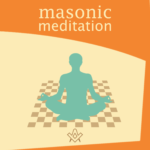 Learn how to practise Masonic meditation in a busy world with all its care and employments |
 Struggling to learn your ritual? Become a 5-Minute Ritualist with the aid of a book of the same name. |
 Day in the life of a Freemason As we start a new year, maybe start it with a new habit? |
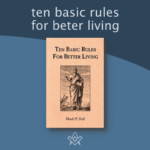 Ten Basic Rules For Better Living Ten Basic Rules For Better Living by Manly P Hall |
 How can we use masonic leadership skills to avoid confrontational situations? |
 How the Trivium is applied to Critical Thinking - {who, what, where, when} - {how} - {why} |
 The Seven Liberal Arts - why 'seven', why 'liberal', why 'arts'? |
 How to improve your public speaking skill with 6 techniques |
 Do you need to speak in public, or present Masonic ritual without notes ? |
 What are logical Fallacies and how to spot them |
 Share one easy tip to learn masonic ritual; Some good tips from Facebook followers |
 How can we use the 7 secrets of the greatest speakers in history |
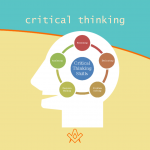 What is a critical thinker and what are their characteristics? |
 Share one personal skill Freemasonry helped you to improve? How can we make practical use of the lessons taught in Masonic writings? |
 An introduction to the art of public speaking - speak with confidence |
 Seven Liberal Arts and Sciences What do you know about Seven Liberal Arts and Sciences |
 Three Words That Will Change Your Life This article discuss a common situation found in many lodges - a difficulty in holding a conversation with a stranger. |
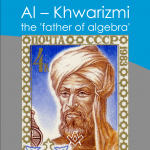 Al - Khwarizmi live c750 - c820 is credited as being the father of Algebra, being asked what is Man, give his answer in an algebraic expression |
masonic knowledge
to be a better citizen of the world
share the square with two brothers

click image to open email app on mobile device


